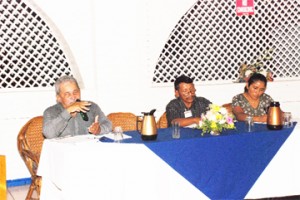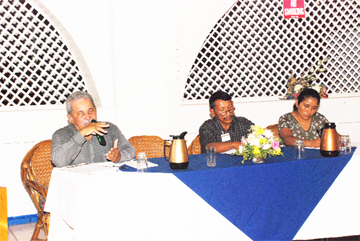 The question of rights to land and the legal recognition by means of title remains the single major unresolved issue affecting indigenous people in Guyana with the present Amerindian Act worsening some of the problems, according to a recent study completed by members of the Wapichan tribe.
The question of rights to land and the legal recognition by means of title remains the single major unresolved issue affecting indigenous people in Guyana with the present Amerindian Act worsening some of the problems, according to a recent study completed by members of the Wapichan tribe.
And while in Guyana there are existing protections for traditional usufruct rights, existing laws are not based upon recognition of indigenous people’s rights and there are no transparent and objective criteria to determine which indigenous lands should be recognised and titled.
Importantly, the study stated that the government has given out much of “Guyana’s resource-rich interior to foreign and local mining and forestry interests. Many of these concessions lie in close proximity to titled indigenous lands or include untitled lands which indigenous peoples have traditionally owned or otherwise used or occupied.”
On a personal level the study found that the integrity of the Wapichan in the South Rupununi indigenous system of sustainable resource use is threatened by inadequate land titles that fail to recognise and protect the customary land tenure system and traditional extensive pattern of farming, hunting, fishing and gathering.
Meanwhile, the existing and potential external threats to the Wapichan area include the imposition of mining or logging concessions on traditional lands; invasions by illegal miners and hunters, colonisation and land invasion linked to international road construction (the road to Brazil from Guyana); imposed protected areas that may affect existing land claims and restricted traditional livelihood activities and imposed and inappropriate tourism activities.
The findings are in what has been described as a “groundbreaking” study done by the Wapichan tribe. The study mainly sought to explore how they customarily use biological resources within their traditional territory and explored the opportunities and challenges relating to effective implementation of article 10(c) of the Convention on Biological Diversity (CBD) at the local and national level.
It has been described as “groundbreaking” because it is said to be the first such research done by an Amerindian tribe on themselves in Guyana.
One of the field coordinators of the study, Toshao Patrick Gomes, said that the study was initiated by the Wapichan Council and it is expected that it would contribute to the drawing up of land management plans by the communities for lands that are traditionally occupied and resources that are used across the entire territory. According to the study, in 2005 the Village Councils and District Toshao Councils reaffirmed that they will never give up their outstanding land claim and will continue to insist to the government that the land issue in the area is resolved.
Titled Wa Wiizo Wa Kaduzu (Our Territory Our Custom), the study was presented to the public yesterday morning at Hotel Tower by the researchers themselves. The event was poorly attended.
Legal framework
While the study noted that Guyanese law since the earliest days of colonisation by Europeans included measures intended to protect the traditional rights of indigenous peoples, it was pointed out that the existing laws enshrine an arbitrary process for land titling based on the government’s discretion.
“In many parts of Guyana, including the South Rupununi, indigenous peoples do not have legal title to a meaningful area for their traditional lands and many communities have no title at all,” the study said.
According to the study, land title issuing by the government in 1976, 1991 and 2004 was not based on indigenous peoples’ customary tenure and traditional resource-use systems and failed to recognise the jurisdiction of indigenous authorities over the full extent of their traditional lands.
Because many indigenous communities have customary settlements outside their titled area the reality is that some of the land area that is important to their very existence is classified as state property. In this way, the study said, the indigenous territories in Guyana have been broken up into small islands of titled lands intersected by state lands.
The study stated that the newly-enacted Amerindian Act of February 2006 does “little to remedy the aforementioned faults with Guyana’s existing legal framework and in some ways exacerbates some of the problems…”
According to the report the new Act removes the legal right for several Amerindian villages to jointly hold title, and requires communities to apply for and hold land titles individually. A part of the Act is said to undermine traditional resource management systems and associated traditional knowledge, both of which are considered to be integral to maintaining subsistence resources and are inter-connected with fundamental spiritual practices.
“It likewise undermines socio-cultural integrity by disrupting traditional systems of exchange-based reciprocal kinship ties and obligations; sometimes causes conflict between communities; and, at a minimum, hinders the free exercise of rights of freedom of association for political and cultural purposes.”
It was also posited that the new Act precludes legal recognition of the collective jurisdiction of the District Toshao Councils over the full extent of traditional Wapichan lands and territory.
Recommendations
The study came up with several recommendations for the government and on the national front the top one is enacting legislation and other measures that recognise and guarantee the rights of indigenous peoples to own, control and peacefully enjoy their traditionally-owned lands, territories and resources.
A call was also made for the recognition of the principle of territoriality and the right of indigenous peoples to collectively own and exercise jurisdiction over their traditional lands and territories, including the waters and resources therein.
The government is also being asked to resolve outstanding land tenure and jurisdictional issues through fair, transparent and mutually acceptable processes. Steps should also be taken to ensure that the Indigenous Peoples Commission begins operation as a matter of priority with a fair balance of indigenous and governmental representatives, and ensure environmental issues, including the implementation of the CBD, are addressed by the Commission.
Recommendations pertaining to the South Rupununi included taking timely measures to address the area’s unresolved land claim and legally recognise and protect their rights to own, control and manage the full extent of Wapichan territory, based on their inherent rights and customary tenure.
They also want maps produced by the communities to be used as legal and legitimate evidence in land claim and demarcation processes and also the government is being asked to legally recognise the right of several of the communities to hold joint collective title to their territory.
The study also recommended that the government recognise the Wapichan’s right to freely exercise autonomous authority and to make rules and regulations for the whole area and enforce them through their own institutions and communities.
On the international level it was recommended that the World Bank, the government and other conservation agencies meet with the indigenous peoples of South Rupununi and other indigenous peoples to ensure that the Guyana Protected Areas Systems (GPAS) is fully consistent with article 10(c) of the CBD.
The study was based on four months of fieldwork undertaken by a team of eight Wapichan researchers in 16 villages and numerous smaller settlements in the area. Article 10(c) of the CBD requires state parties to “protect and encourage customary use of biological resources in accordance with traditional cultural parties that are compatible with conservation and sustainable use requirements.”
By adopting the convention, governments have agreed that sustainable use of biodiversity is enhanced by supportive policies, laws and institutions at all levels of governance and that indigenous and local communities should be empowered to manage biological resources and their rights over and/or stewardship of biological resources should be recognised and reinforced.
The study concluded that the existing laws and policies in Guyana are largely inadequate for providing effective implementation of the Article and therefore requires considerable revision and amendment.
Financial support for the study was given by the Netherlands Ministry of Foreign Affairs and the Novib-Hivos Biodiversity Fund. (Oluatoyin Alleyne)






